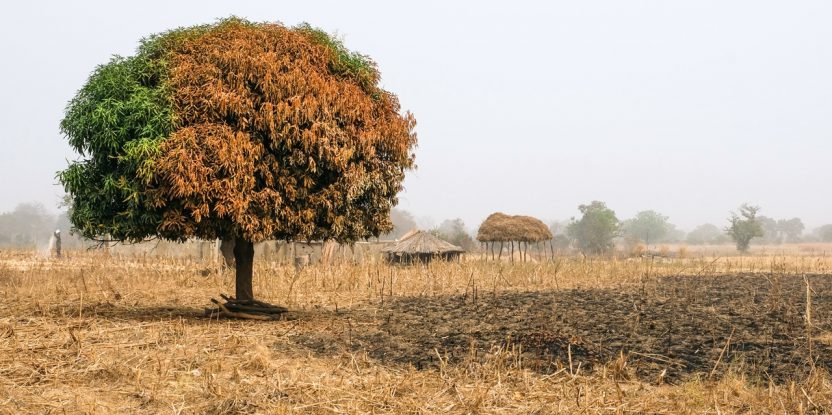From farmers and chiefs through local NGOs to government, stakeholders in Ghana’s Western Wildlife Corridor brought their concerns about autonomy, livelihoods and who controls the land and its resources to an inception workshop for the COLANDS initiative.
Although the Collaborating to Operationalize Landscape Approaches for Nature, Development and Sustainability (COLANDS) initiative began in 2019, the COVID-19 pandemic control measures meant that an inception workshop in Ghana in April 2022 was the first opportunity for everyone involved to meet in person.
Resolving conflicts over land use was a major theme during the workshop.
Land-use conflicts occur where agriculture, livestock, mining and other productive processes are in competition with environmental, social and biodiversity conservation goals, according to Emmanuel Yeboah, regional manager of the Forest Services Division of Ghana’s Forest Commission, one of the speakers at the workshop.
To help address such conflicts, everyone present emphasized the need for multi-stakeholder platforms to be inclusive, adequately funded and to have strong human and technical resources to ensure they continue after a project ends.
Multi-stakeholder platforms — which are gatherings of all parties interested in a landscape — are critically important for discussion among diverse groups who normally would rarely, if ever, speak to one another. In coming together, they become familiar with each other’s concerns, share knowledge and experience and build each other’s capacity.
“It is good for us to share information so that anywhere we find ourselves, we make good use of what someone else is already working on to avoid duplication of efforts and to ensure continuity of what others have initiated,” said one participant, who asked to remain anonymous.
The key objectives of these platforms include natural resource management, governance, dialogue and training.
“I wanted to bring this idea here, so that we see how best collectively we can look at it,” said one man, concerned about the potential for conflict over land use, who also asked to remain anonymous.
The stakes are high: concerns were raised during the workshop about encroachment into forest reserve areas by farmers, driven by a growing population and rising demand for land.
Ghana, along with Indonesia and Zambia, are the locations in which the Center for International Forestry Research and World Agroforestry (CIFOR-ICRAF) is carrying out the COLANDS initiative, formally led by CIFOR.
An earlier mission to determine the actual scope of the project in northern Ghana concluded that implementation sites should give priority to “community-based natural resource management areas”, known more simply as CREMA. The CREMA model was established by Ghana’s government in the early 2000s to conserve biodiversity by involving communities in the protection and sustainable use of natural resources.
Significant challenges confronting sustainable land use in the region include bush fires, illegal logging (especially for valuable rosewood (Pterocarpus erinaceous)), charcoal production, wildlife poaching, gold panning, agricultural expansion into forest reserves and the activities of pastoralists, particularly the Fulani herdsmen, say people in the three areas visited by COLANDS.
Accordingly, efforts so far by COLANDS in Ghana have focused on the grassroots, bottom–up perspective of individuals living and working at landscape level, said Terry Sunderland, a COLANDS team leader and professor at the University of British Columbia.
“This project is about taking the theories and applying them on the ground in a practical manner with participation from stakeholders who live within, and understand, their landscape more than anyone else,” he said.
He stressed that it was vital to build on the traditional knowledge and experience of an area, to understand where and why changes have occurred in a landscape. He gave the example of members of a small community in Cambodia he had worked with, who shared their landscape knowledge dating back 200 years.
“Through their storytelling, we were able to draft a really detailed time-series analysis of people’s perceptions of changes that happened in that landscape,” Sunderland said.
“The COLANDS findings will have practical applications, informing future evidence-based research, policy and practice agendas while enhancing stakeholder capacity… to implement integrated landscape approaches,” confirmed Yeboah.
Next steps will include agreeing on key indicators in the Ghana landscape that can provide a baseline for later monitoring to assess whether the platforms are achieving the desired outcomes.
Northern Ghana is the country’s largest landlocked area and occupies almost 60 percent of the country. The climate is hot and dry with only one rainy season owing to its proximity to the Sahel region. The landscape is dominated by vast areas of grassland, with scattered savannah woodland characterized by drought-resistant trees, such as shea (Vitellaria paradoxa), African locust bean (Parkia biglobosa), baobab (Adansonia digitata) and acacia.
Participants at the workshop included representatives from the Wildlife Division and Forest Service Division of the Forestry Commission of Ghana, Ministry of Food and Agriculture, Environmental Protection Agency, Water Resources Commission, and the Ghana Shea Landscape Emission Reductions Project. NGOs and others represented included A Rocha Ghana, Savannah Fruit Company, ORGIIS Ghana, TREE AID Ghana, Shea Cooperatives Union and the Association of Fulani in Ghana.
COLANDS is part of the International Climate Initiative (IKI) and is funded by the German Federal Ministry for the Environment, Nature Conservation and Nuclear Safety (BMU).
PhD research that is part of COLANDS is hosted at the Institute for Social Science Research of the University of Amsterdam and the University of British Columbia.
We want you to share Forests News content, which is licensed under Creative Commons Attribution-NonCommercial-ShareAlike 4.0 International (CC BY-NC-SA 4.0). This means you are free to redistribute our material for non-commercial purposes. All we ask is that you give Forests News appropriate credit and link to the original Forests News content, indicate if changes were made, and distribute your contributions under the same Creative Commons license. You must notify Forests News if you repost, reprint or reuse our materials by contacting forestsnews@cifor-icraf.org.
